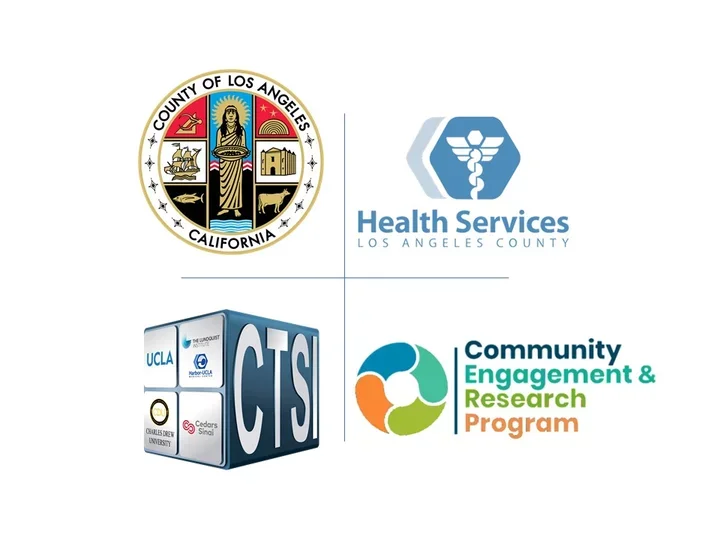UCLA / DHS Safety-Net Health Innovation Awards
Alert
The UCLA Clinical and Translational Science Institute (CTSI) and the Los Angeles County Health and Mental Health Services Agencies—Departments of Health Services, Mental Health, and Public Health (DHS, DPH, and DMH) are partnering to develop and test interventions to enhance quality, efficiency and patient-centeredness of care. This solicitation requests letters of intent that describe ideas for such programs from which formal applications for funding will be selected.

Three grants of up to $75,000 (one grant at each agency: DHS, DPH, DMH) will be issued to support the design and small-scale implementation of interventions or augmenting existing programs within the health and mental health services agencies that will achieve the goals of quality, efficiency and patient centered care.
The projects can focus on interventions in clinical care, health services, or health-related policies. The project can also focus on a rigorous evaluation of a natural experiment. The project will need to be completed within 2 years of notice of award. The agencies will provide resources and operational support for the selected projects. Successful projects will demonstrate clinical, policy, and scientific impact. When completed, successful projects will serve as a base for sustaining extramural funding to implement and formally evaluate the intervention(s) on a larger scale and longer timeframe within the health and mental health services agencies. Acceptable funding mechanisms include but are not limited to NIH R01, R21, R03; PCORI, AHRQ, CDC, and CMS Center for Innovation.
Purpose
The UCLA Clinical and Translational Science Institute (CTSI) and the Los Angeles County Health and Mental Health Services Agencies (including DHS, DPH, and DMH) are partnering to develop and test interventions to enhance quality, efficiency and patient centeredness of care provided by the agencies. The UCLA CTSI and LAC agencies are committed to fostering the professional development of clinician-investigators and translational scientists as they strive to close the knowledge-to-practice gap in our regional healthcare delivery systems. This solicitation requests letters of intent that describe ideas for such projects. More detailed applications for funding will be solicited from a subset of the submitted intent letters.
Description of the Funding Opportunity
UCLA CTSI and the Los Angeles County Health and Mental Health Services Agencies intend to issue three grants of up to $75,000 (one foreach agency: DHS, DPH, DMH) for up to two years to support the design and small-scale implementation of interventions or augmenting existing programs within the health and mental health services agencies that will achieve the goals of quality, efficiency and patient centered care. The agencies will provide operational support for the selected projects. The partners intend to support scientific endeavors that provide value to agencies within the project period and generate results that enable project teams to seek extramural funding for larger scale implementation or further application of the strategies tested in the project. Acceptable funding mechanisms that applicant teams can seek to pursue include, but are not limited to, NIH R01, R21, R03; PCORI, AHRQ, CDC, and CMS Center for Innovation.
This RFA focuses on implementation, which refers to the systematic uptake of proven clinical treatments, practices, organizational, and management interventions into routine practice with the intent of improving health. It is expected that the proposed program will impact patients (e.g., increased access, improved experience, better health outcomes or reduced health disparities) and efficiency (e.g., improving efficiency of outpatient care, reducing use of unnecessary diagnostic testing).
Examples of healthcare impact measures include, but are not limited to, use of group visits; selective and targeted use of synchronous telehealth, especially for distant clinics/patients; optimized clinic staffing, space, and patient volume/complexity; specialty to primary care transitions after consultation; specialty chronic disease management. Examples of reducing testing include but are not limited to: applications with low specificity or low predictive value, for example: certain radiology tests (e.g., for back pain, headaches, total body scans, abdominal pain); certain lab tests (e.g., for rare or unusual conditions); sleep studies; echocardiograms.
The program is designed to support projects that:
- Test a solution for a bona fide problem within healthcare;
- Test solution(s) aligned with the DHS’s specific infrastructure, business approach and operations;
- Involve broad participation across sites and disciplines; and
- Focus on effectiveness (i.e., whether the intervention works in real-life), as opposed to efficacy.
This program does NOT support projects that:
- Seek to only measure or understand a problem or solution
- Are proposed as theoretically good ideas
- Involve a single discipline or single hospital or clinic
- Focus on efficacy (whether the intervention works under controlled conditions)
The proposed study design should suit the specific problem and align with LAC health and mental health services agencies’ priorities and guidelines for the RFA. Viable approaches/methods to consider include behavioral economics, design thinking, systems engineering, improvement science, and implementation science. We encourage team science in which people come together from different disciplines. We also encourage disruptive innovation, by which we mean introducing new, innovative ideas for approaches to care delivery that fundamentally transform aspects of how care is delivered and that are well suited to the population served.
Eligibility
Awards will be made to research teams consisting of investigators with an appointment at UCLA working closely with investigators and staff members from DHS, DPH, DMH to design and conduct proposed projects. Multisite collaboration is strongly encouraged. The projects must show evidence of meaningful engagement, and the team must include patient or community partners. All UCLA faculty members in any series (tenured/non-tenured) including adjunct and professional research series may apply.
Workshop Opportunity
We are pleased to offer an invitation-only workshop and feedback session, which will be open only to selected investigators who have submitted an LOI. This planning workshop will be held in mid-March as a virtual meeting to enable maximum participation, with the option to view a recording at a later date. Content experts from the funding partners will be available to provide additional guidance and consultations on project ideas, and assessment of each proposed project’s adherence to the Implementation Science program’s aims. The workshop agenda will also include brief remarks by the sponsors and an opportunity for networking with other investigators and DHS staff. All project team members and collaborators are encouraged to attend. While attendance at the planning workshop is strongly encouraged, attendance is not a prerequisite to proceeding with submitting a full application, if invited.
Letter of Intent (LOI)
Applicants should submit a brief LOI that describes:
- The challenge in LAC health care system that they propose to address [100 words max]
- The intervention or approach that they propose to develop and test [100 words max]
- The expertise proposed for the project, including the names and expertise of the PI and known co-investigators as well as any additional areas of expertise that will be required [no limit]
- The expected impact of the intervention on quality, efficiency and patient centeredness of care within DHS, DPH, DMH [100 words max]
- Letter of Support from relevant DHS, DPH, DMH stakeholders or working group
Submission: LOIs must be submitted by 5pm PST on March 13, 2026 through https://www.ctrc.medsch.ucla.edu/redcap/surveys/?s=E3K9HH47P8PYPPEX
Questions can be addressed to Gloria Kim (gloriakim@mednet.ucla.edu) at UCLA.
Review
LOIs will be reviewed by representatives of the UCLA CTSI and LAC health and mental health services agencies for potential to improve quality, efficiency and patient centeredness of care within the LAC DHS delivery system. Applicants should describe how the proposed research contributes to DHS, DPH, DMH delivery system goals, and its potential for/relevance to large-scale implementation within DHS, DPH, DMH and dissemination of findings more broadly. Projects that adhere to the criteria outlined above will be most strongly considered to proceed with a full proposal.
Next Steps
LOIs will be chosen for further consideration within two weeks of LOI submission. At that time, selected applicants will receive information on the planning workshop held in late April. Representatives from the participating CTSIs and DHS, DPH, DMH will be available at the workshop and outside of it to advise applicants as they assemble research teams and identify enabling resources (e.g., access to EHR) that will be needed for their proposed projects.
Summary of Timeline
Summary of Timeline:
- Receipt Deadline for Letters of Intent: March 13, 2026
- Notification of Decision: early April 2026
- Planning Workshop: late April 2026
- Receipt Deadline for Full Proposals: May 29,2026
- Notification of Awardees: early July 2026
- Award Start Date: September 1, 2026
About UCLA CTSI
The UCLA Clinical and Translational Science Institute (CTSI) is a research partnership of UCLA, Cedars-Sinai Medical Center, Charles R. Drew University of Medicine and Science and the Lundquist Institute for Biomedical Innovation at Harbor-UCLA Medical Center. Its mission is to bring biomedical innovations to bear on the greatest health needs of Los Angeles—one of the most ethnically and economically diverse counties in the United States. Our vision is to catalyze research that translates discoveries into tangible improvements in health care, disease prevention and health in our community. The UCLA CTSI is one of more than 50 research hubs supported by the Clinical and Translational Sciences Award (CTSA) program of National Center for Advancing Translational Sciences (NCATS). NCATS—one of 27 Institutes and Centers at the National Institutes of Health (NIH)—was established to transform the translational process so that new treatments and cures for disease can be delivered to patients faster.
Recent News



